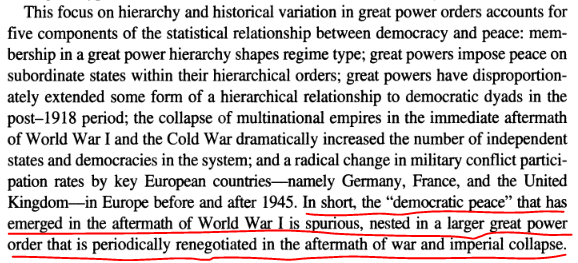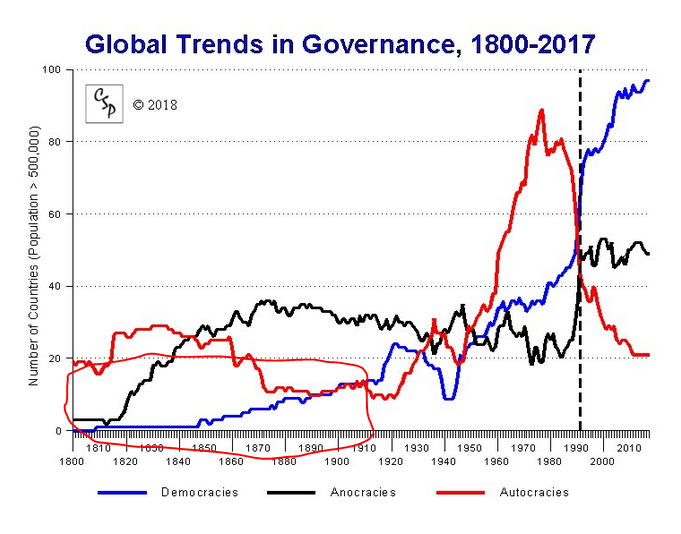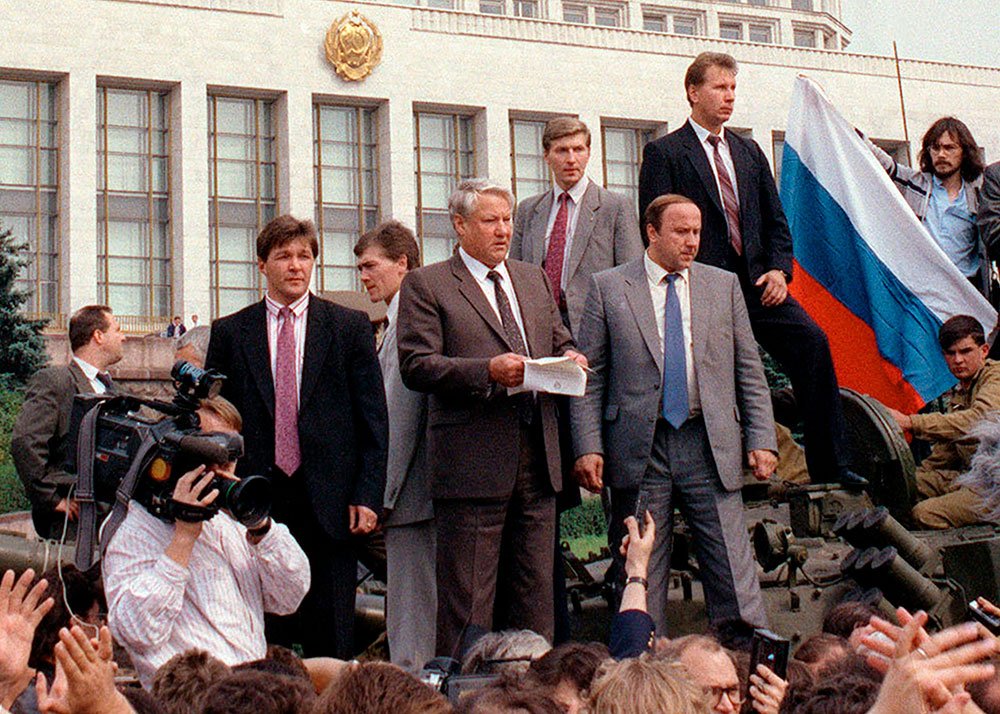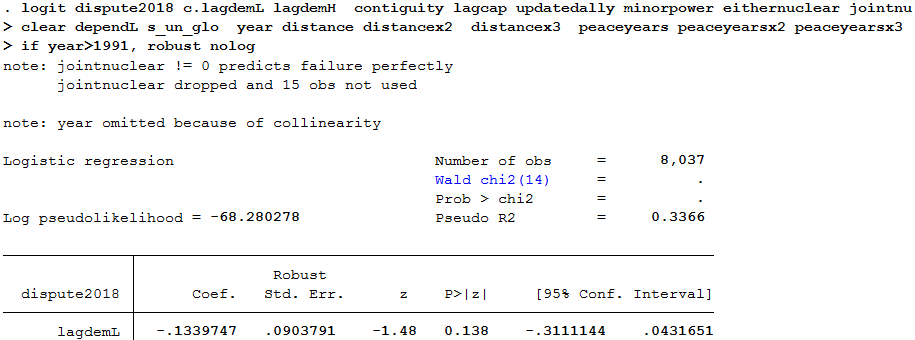
Is the "Democratic Peace" a stronger scientific finding than the link b/w smoking & lung cancer?
That's the claim made in this new @IntOrgJournal paper. Let's unpack it.
[THREAD]
cambridge.org/core/journals/…
That's the claim made in this new @IntOrgJournal paper. Let's unpack it.
[THREAD]
cambridge.org/core/journals/…
Before diving into the paper's specific claim, a few prefacing points.
First, to make sure we're all on the same page, the democratic peace is the claim that democracies rarely fight one another. The below thread covers the history of this "empirical law", reviewing work that I cover in my "Quantitative Security" course
https://twitter.com/ProfPaulPoast/status/1338470785921540100
Second, I have MUCH respect for the authors of this paper. They are terrific methodologists. Moreover, this is an extremely valuable methodological paper. @IntOrgJournal has published such papers in the past, namely...
...@Prof_BearB piece on the use of interaction terms (very common -- or should be very common -- in quantitative studies of international politics)...
cambridge.org/core/journals/…
cambridge.org/core/journals/…
Third, I'm a big fan of the methods they are advocating for in this paper. For me, they are preaching to the choir.
I've used sensitivity analysis in this @IntOrgJournal paper...
cambridge.org/core/journals/…
I've used sensitivity analysis in this @IntOrgJournal paper...
cambridge.org/core/journals/…
And, along with Walter Mebane, I've advocated for more use of non-parametric approaches by IR scholars, such as Manski Bounds. See this @polanalysis piece.
cambridge.org/core/journals/…
cambridge.org/core/journals/…
Okay, I know that's a lot of caveats and prefacing points. I just want to make clear that I really like this paper and want people to find the method valuable.
BUT..."the relationship between democracy and peace is at least five times as robust as that between smoking and lung cancer"?
🤔🤨
🤔🤨
They make this claim by applying a nifty technique from a 1959 paper by Cornfield et al....
academic.oup.com/jnci/article-a…
academic.oup.com/jnci/article-a…
...to three prominent studies of the democratic peace. A study by Gartzke in @AJPS_Editor...
onlinelibrary.wiley.com/doi/abs/10.111…
onlinelibrary.wiley.com/doi/abs/10.111…
Applying the technique to those papers, they find that there are virtually no confounding variables that are sufficiently strong enough to overturn the finding that if two states are democracies, then they are unlikely to enter military conflict with one another.
The only time they do find confounders strong enough is if they limit the samples in ways that were not advocated by the original authors 

This leads them to claim the following: "To explain away the democratic peace, researchers must find confounders that are many times more strongly associated with democracy and conflicts than the confounders that have been identified in the prior studies."
They add: "Since such confounders have yet to be found, for now we conclude that the existing empirical evidence overwhelmingly supports the democratic peace."
Honestly, I have no problem with this claim...given the papers they analyzed.
But I do have two concerns.
But I do have two concerns.
Concern 1: the smoking comparison. As they state in the abstract and introduction (and go into some detail in the paper, especially when reanalyzing the Gartzke paper): 

Does such a comparison even make sense? As @SevaUT points out, they are VERY, VERY different relationships from VERY, VERY different populations. It's not 🍎🍊, but 🍎🛻
https://twitter.com/SevaUT/status/1379390600940769283
Concern 2: I'm not sure they chose the best papers to use for their analysis.
There are much more recent papers, such as the recent @IntOrgJournal paper by Joslyn Barnhart, @RobertTrager, @ProfSaunders, & @AllanDafoe which finds that women's suffrage is a key factor in driving the dem peace finding.
cambridge.org/core/journals/…
cambridge.org/core/journals/…
But the main paper they should have analyzed (though they do cite it) is Pat McDonald's 2015 @IntOrgJournal piece. That's because it offers perhaps the best critique of the democratic peace finding
cambridge.org/core/journals/…
cambridge.org/core/journals/…
A key claim in Pat's paper is that the Democratic Peace finding does exist...but it is the product of US hegemony, largely during the Cold War. 

One way to see what Pat is talking about is to take the "standard model" of the democratic peace (the dyadic model based on the work of Oneal and Russett)...
cambridge.org/core/journals/…
cambridge.org/core/journals/…
....and reanalyze the model in four time periods:
- Pre-WWI: 1816 (when our data typically start) to 1914
- Interwar: 1919-1939
- Cold War: 1945-1991
- Post Cold War: After 1991
- Pre-WWI: 1816 (when our data typically start) to 1914
- Interwar: 1919-1939
- Cold War: 1945-1991
- Post Cold War: After 1991
When doing this, we find that the variable for "joint democracy" (or the lower of the Polity scores, which ever you prefer) is not statistically significant for the early time period... 

The null result for the early time period could just be due to the simple lack of democracies for most of that time period 

But the end of the Cold War, and the subsequent "wave" of democracies, seems like it can be easily dismissed.
press.uchicago.edu/ucp/books/book…
press.uchicago.edu/ucp/books/book…
Indeed, the collapse of the Berlin Wall (and then collapse of the Soviet Union itself) might be EXACTLY the type of major confounder -- structural system change -- called for by the Imai and Lo paper 



So I decided to find out for myself. I decided to treat "Post-Cold War" as a confounder by creating a dummy variable 

I then create a binary version of the join democracy variable (which they do as well, since it is necessary for the technique) 

And finally I create a variable "Peace", as the technique requires that one looks at the phenomenon that the "treatment" is supposed to make MORE likely (in this case, Joint Democracy makes "Peace" more likely) 

Having created these three variables, I am now ready to use the Cornfield et al method.
Side note: that's really all you need! Three dummy variables. No regression models. Again, I like this technique!!
Side note: that's really all you need! Three dummy variables. No regression models. Again, I like this technique!!
What do I find?
First, I need to compute several quantities
First, I need to compute several quantities
Given these three quantities I can now check several key conditions. If these conditions hold, then U (i.e. Post-Cold War) is a meaningful confounder that undermines the X-Y relationship (i.e. Democratic Peace)
What does this mean? Since the cornfield conditions are satisfied, this suggests that the Post-Cold War confounder IS strong enough to overturn the evidence for the democratic peace.
Is this definitive proof debunking the democratic peace? No. But it is not a law. The Democratic Peace is an observable characteristic of a very particular time period and largely a product of US hegemony and order building.
press.princeton.edu/books/hardcove…
press.princeton.edu/books/hardcove…
More generally, it shows that the Dem peace finding is highly context and specification specific.
My understanding is that this is not the case with the smoking to cancer link
pubmed.ncbi.nlm.nih.gov/30103527/
My understanding is that this is not the case with the smoking to cancer link
pubmed.ncbi.nlm.nih.gov/30103527/

In sum, methodologically speaking, this is a super useful piece that should be widely taught.
But I think the characterization of the democratic peace as a stronger relationship than smoking and cancer was too strong of a claim.
[END]
But I think the characterization of the democratic peace as a stronger relationship than smoking and cancer was too strong of a claim.
[END]
• • •
Missing some Tweet in this thread? You can try to
force a refresh

























